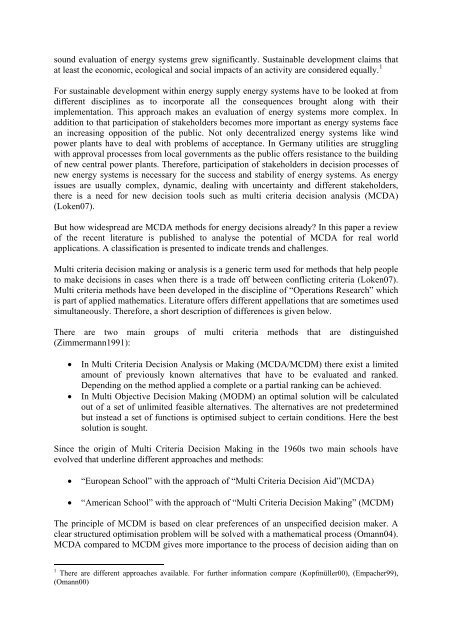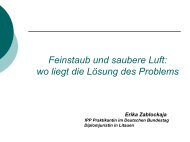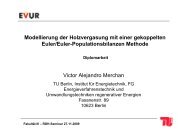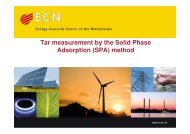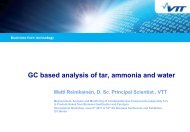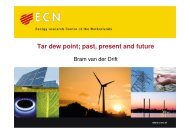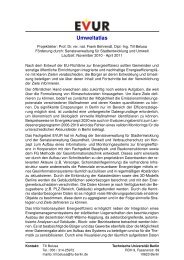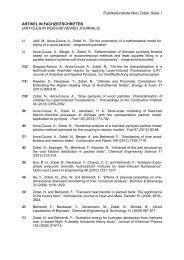Insert the title here - EVUR - TU Berlin
Insert the title here - EVUR - TU Berlin
Insert the title here - EVUR - TU Berlin
You also want an ePaper? Increase the reach of your titles
YUMPU automatically turns print PDFs into web optimized ePapers that Google loves.
sound evaluation of energy systems grew significantly. Sustainable development claims that<br />
at least <strong>the</strong> economic, ecological and social impacts of an activity are considered equally. 1<br />
For sustainable development within energy supply energy systems have to be looked at from<br />
different disciplines as to incorporate all <strong>the</strong> consequences brought along with <strong>the</strong>ir<br />
implementation. This approach makes an evaluation of energy systems more complex. In<br />
addition to that participation of stakeholders becomes more important as energy systems face<br />
an increasing opposition of <strong>the</strong> public. Not only decentralized energy systems like wind<br />
power plants have to deal with problems of acceptance. In Germany utilities are struggling<br />
with approval processes from local governments as <strong>the</strong> public offers resistance to <strong>the</strong> building<br />
of new central power plants. T<strong>here</strong>fore, participation of stakeholders in decision processes of<br />
new energy systems is necessary for <strong>the</strong> success and stability of energy systems. As energy<br />
issues are usually complex, dynamic, dealing with uncertainty and different stakeholders,<br />
<strong>the</strong>re is a need for new decision tools such as multi criteria decision analysis (MCDA)<br />
(Loken07).<br />
But how widespread are MCDA methods for energy decisions already? In this paper a review<br />
of <strong>the</strong> recent literature is published to analyse <strong>the</strong> potential of MCDA for real world<br />
applications. A classification is presented to indicate trends and challenges.<br />
Multi criteria decision making or analysis is a generic term used for methods that help people<br />
to make decisions in cases when <strong>the</strong>re is a trade off between conflicting criteria (Loken07).<br />
Multi criteria methods have been developed in <strong>the</strong> discipline of “Operations Research” which<br />
is part of applied ma<strong>the</strong>matics. Literature offers different appellations that are sometimes used<br />
simultaneously. T<strong>here</strong>fore, a short description of differences is given below.<br />
T<strong>here</strong> are two main groups of multi criteria methods that are distinguished<br />
(Zimmermann1991):<br />
• In Multi Criteria Decision Analysis or Making (MCDA/MCDM) <strong>the</strong>re exist a limited<br />
amount of previously known alternatives that have to be evaluated and ranked.<br />
Depending on <strong>the</strong> method applied a complete or a partial ranking can be achieved.<br />
• In Multi Objective Decision Making (MODM) an optimal solution will be calculated<br />
out of a set of unlimited feasible alternatives. The alternatives are not predetermined<br />
but instead a set of functions is optimised subject to certain conditions. Here <strong>the</strong> best<br />
solution is sought.<br />
Since <strong>the</strong> origin of Multi Criteria Decision Making in <strong>the</strong> 1960s two main schools have<br />
evolved that underline different approaches and methods:<br />
• “European School” with <strong>the</strong> approach of “Multi Criteria Decision Aid”(MCDA)<br />
• “American School” with <strong>the</strong> approach of “Multi Criteria Decision Making” (MCDM)<br />
The principle of MCDM is based on clear preferences of an unspecified decision maker. A<br />
clear structured optimisation problem will be solved with a ma<strong>the</strong>matical process (Omann04).<br />
MCDA compared to MCDM gives more importance to <strong>the</strong> process of decision aiding than on<br />
1<br />
T<strong>here</strong> are different approaches available. For fur<strong>the</strong>r information compare (Kopfmüller00), (Empacher99),<br />
(Omann00)


